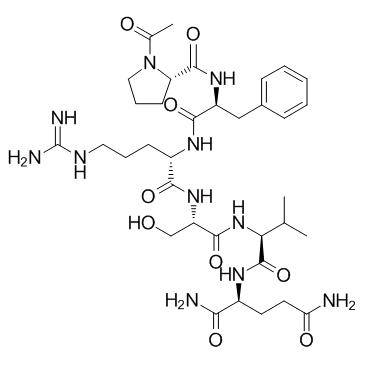
KKI-5
CAS No. 97145-43-2
KKI-5( —— )
Catalog No. M30490 CAS No. 97145-43-2
KKI 5 is a serine protease inhibitor that inhibits kallikrein and plasmin. KKI 5 may exhibit anticancer chemotherapeutic benefit and may also be used as a treatment for angioedema.
Purity : >98% (HPLC)
 COA
COA
 Datasheet
Datasheet
 HNMR
HNMR
 HPLC
HPLC
 MSDS
MSDS
 Handing Instructions
Handing Instructions
| Size | Price / USD | Stock | Quantity |
| 5MG | 158 | Get Quote |


|
| 10MG | 284 | Get Quote |


|
| 100MG | Get Quote | Get Quote |


|
| 200MG | Get Quote | Get Quote |


|
| 500MG | Get Quote | Get Quote |


|
Biological Information
-
Product NameKKI-5
-
NoteResearch use only, not for human use.
-
Brief DescriptionKKI 5 is a serine protease inhibitor that inhibits kallikrein and plasmin. KKI 5 may exhibit anticancer chemotherapeutic benefit and may also be used as a treatment for angioedema.
-
DescriptionKKI 5 is a serine protease inhibitor that inhibits kallikrein and plasmin. KKI 5 may exhibit anticancer chemotherapeutic benefit and may also be used as a treatment for angioedema.(In Vitro):The KKI-5 Peptide corresponds to aa386-391 of bovine kininogen-1 that encompasses the aa388-389 kallikrein proteolytic site. The synthetic KKI-5 can attenuate breast cancer cell invasion, therefore it is investigated for its role in invasion and metastasis of cancer cells.
-
In VitroThe KKI-5 Peptide corresponds to aa386-391 of bovine kininogen-1 that encompasses the aa388-389 kallikrein proteolytic site. The synthetic KKI-5 can attenuate breast cancer cell invasion, therefore it is investigated for its role in invasion and metastasis of cancer cells.
-
In Vivo——
-
Synonyms——
-
PathwayOthers
-
TargetOther Targets
-
RecptorKallikrein Inhibitor
-
Research Area——
-
Indication——
Chemical Information
-
CAS Number97145-43-2
-
Formula Weight773.88
-
Molecular FormulaC35H55N11O9
-
Purity>98% (HPLC)
-
Solubility——
-
SMILES——
-
Chemical NameSequence:Ac-Pro-Phe-Arg-Ser-Val-Gln-NH2
Shipping & Storage Information
-
Storage(-20℃)
-
ShippingWith Ice Pack
-
Stability≥ 2 years
Reference
Deshpande MS, et al. Mapping the binding site of tissue kallikrein: preparation and testing of all possible substrate analog inhibitors homologous with the sequence of kininogen between Ser386 and Gln392. J Med Chem. 1992 Aug 21;35(17):3094-102.
molnova catalog



related products
-
meplazumab
meplazumab is a humanized anti-CD147 antibody, as add-on therapy in patients with COVID-19 pneumonia.
-
4-Hydroxyglucobrassi...
The seeds of Sinapis alba L.
-
Prosaikogenin F
Prosaikogenin F is a natural product with anticancer and hemolytic properties .



 Cart
Cart
 sales@molnova.com
sales@molnova.com


